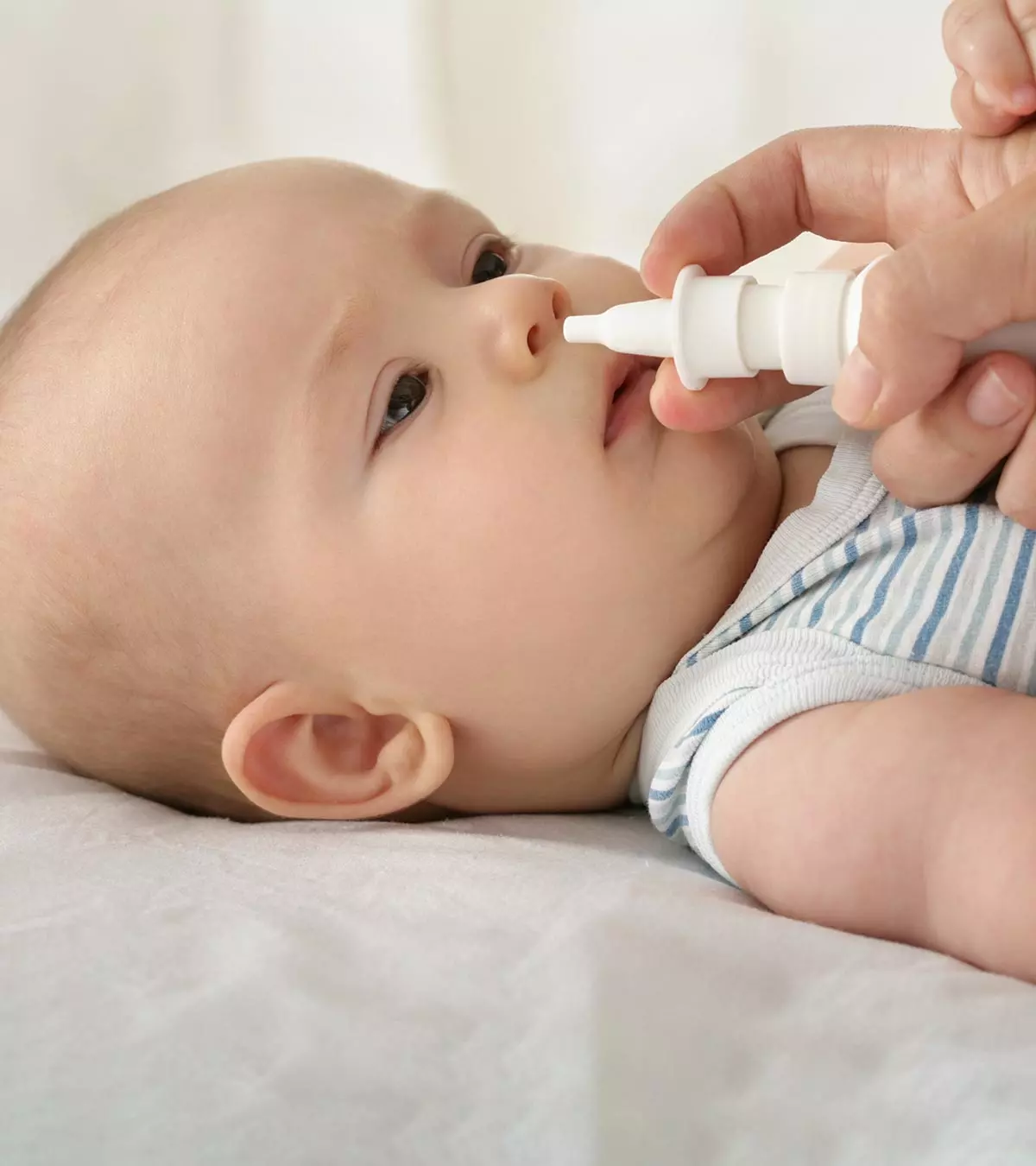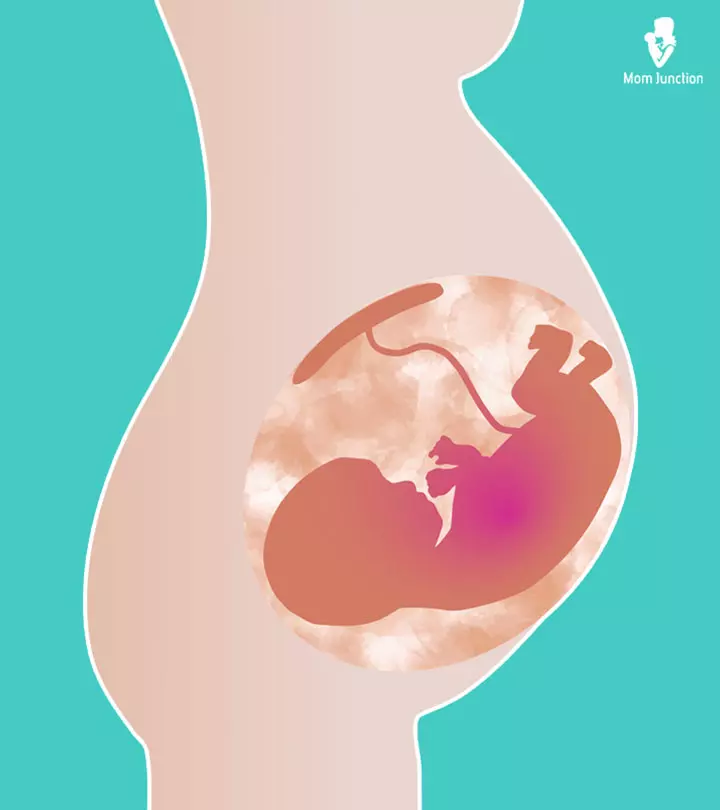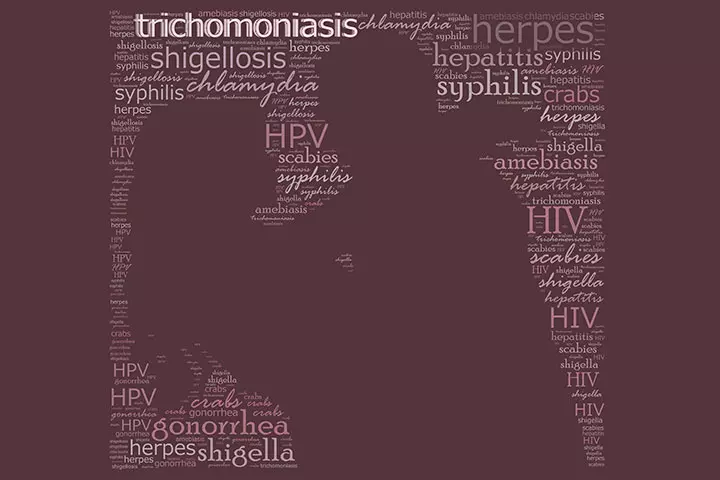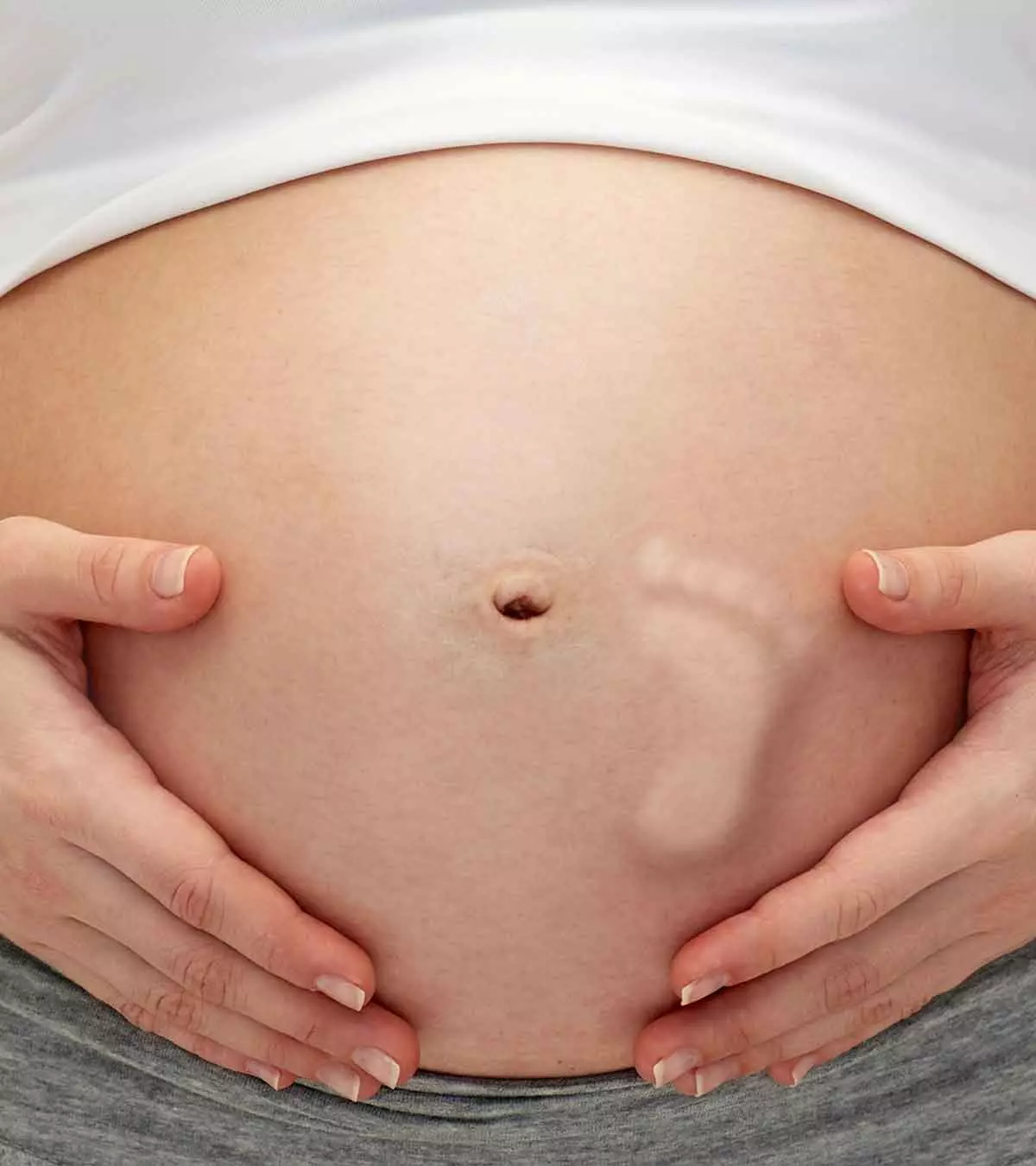
Image: ShutterStock
Expecting mothers are excited about their baby’s kicks during pregnancy. These kicks start after a particular gestationaliPeriod from conception to the birth of the baby. age and keep reminding you of the life that is growing inside and will soon be in your arms. The kicks also enable fathers to connect with their babies. Moreover, the baby’s kicks indicate good fetal health and development. Therefore, most doctors advise you to keep track of these movements to ensure the well-being of the growing baby.

The below post shares some facts about the baby’s kicks and a chart that helps track your baby’s movements.
Key Pointers
- Baby’s movements, such as kicking and rolling, indicate healthy development in the womb.
- Typically, these movements start after nine weeks of pregnancy.
- At around 20 weeks, babies start to hear external sounds, and their kicking may be a response to these sounds.
- Decreased fetal movements may indicate fetal distress, and it’s crucial to consult a doctor immediately for further evaluation and care.
Interesting Baby Kick Facts
After reading these facts, you cannot but marvel at the miracle called pregnancy.
1. Kicks generally signify normal development and health of a baby
The baby kicks usually indicate that your baby is developing well inside the womb.
You can understand that the baby is active when they turn, tumble, roll, and kick inside the womb. Moreover, a swishing feeling or flutter can be experienced in the abdomen when the baby stretches out its limbs. These movements become more distinct towards the later stages of pregnancy.
 Quick fact
Quick fact2. The baby is likely to respond to external stimuli
Babies kick in response to some changes in the surrounding environment. Any external stimuli such as the food you eat or different noises can make the baby move or kick.
- Response to sounds: During the 20th week, the fetus begins to hear low-pitch sounds and gradually begins to high-pitch sounds as the pregnancy proceeds (1). These movements can indicate the normal growth of the baby.
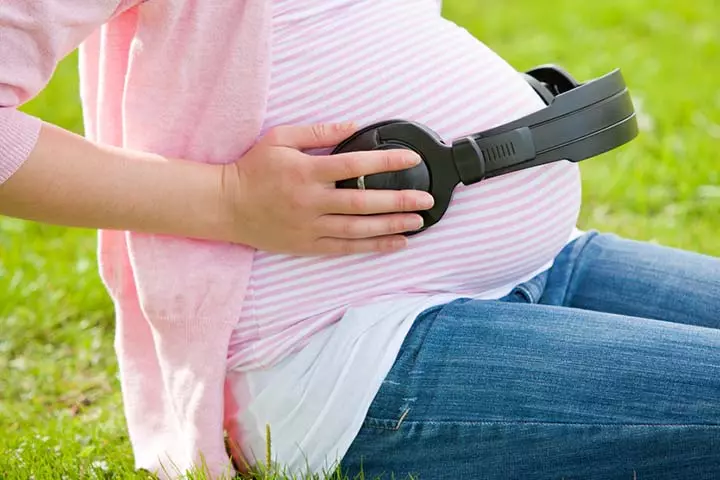
- Response to foods: The food that the mother eats during pregnancy introduces the baby to various flavors through the amniotic fluidiClear fluid surrounding the baby in the uterus. that surrounds the baby inside the womb. These flavors can make the baby move if they like or dislike them (2).
3. The baby’s kicks increase when lying on the side
You can feel more kicks if you sleep on your side. This is because the supply of blood to the baby increases while lying on the left or right side, thereby improving their movements.
Professor Peter Stone of the Faculty of Medical and Health Sciences, who led a study published in The Journal of Physiology, says: “When the mother slept on her back, the baby became less active, which conserves oxygen. We found that the babies were only in an active state when the mother was on her left or right side. When the mother changed position during sleep, for example from left to back sleeping, the baby quickly changed activity state.”
4. Kicks are felt after nine weeks
A feeling of flutter in the abdomen during the early stages of pregnancy is an indication of baby movements.
The movements start around the seventh week of pregnancy, which is very early for the expecting mother to feel them. Typically, babies start kicking after sixteen weeks of gestation as they start moving their limbs. However, if you’re pregnant for the first time, you may not feel the fetal movement until 20 weeks of gestation (3). The early kicks can be detected during an ultrasound scan. Once you are 24 weeks pregnant, you can feel the baby’s kicks and hiccups quite often.
 Quick tip
Quick tip5. Reduced kicks might indicate the baby’s distress
Once you complete 28 weeks, your doctor advises you to keep a count of the baby’s kicks. A baby, usually, kicks ten times in two hours (4). Reduced fetal activity can indicate fetal distress such as:
- Maternal stress or nutritional problems. Your emotional and physical state impacts the baby’s movements. Similarly, inadequate nutritional supply can lead to improper development of the brain and hamper the fetal neurodevelopment, which can reduce fetal movement patterns. Drink a lot of water or keep walking around if you do not feel the movement of the baby.
- Placental abruption. This is an emergency. Dark bleeding with clots as well as woody hard and tender abdomen. It can restrict the flow of blood and oxygen to the fetus, impacting its development.
- Premature rupture of the amniotic sac. It can lead to decreased amniotic fluid and slow down fetal responses or movements due to stress or insufficient supply of oxygen.
- Fetal hypoxia: This condition arises when the umbilical cordiA cordlike structure that connects the baby to the mother’s placenta. gets twisted, kinked or deformed. This cuts the supply of oxygen to the baby.
An ultrasound scan or a non-stress test can help determine the baby’s heartbeat and the reason for reduced fetal movements.

6. Nothing to worry about reduced kicks in late pregnancy
Usually, babies take rest in the womb for 20 to 40 minutes (sometimes up to 90 minutes) at a time. However, as they grow in size, their movements and rolling become difficult in the later stages of pregnancy. Therefore, it is normal for the number of kicks to reduce. However, during this time, you may experience painful kicks under your ribs and jerking that lasts for a few minutes (5).
Julia, a mother of four, shares her experience with baby’s kicks during the later stages of pregnancy. She says, “I feel him (my son) kicking my bladder directly many times a day, and am peeing more than ever.
“If I do forget that I’m pregnant for a span of time, he will remind me by kicking my lungs and/or cervix with authority (i).”
7. Fetal movement indicates future behavior
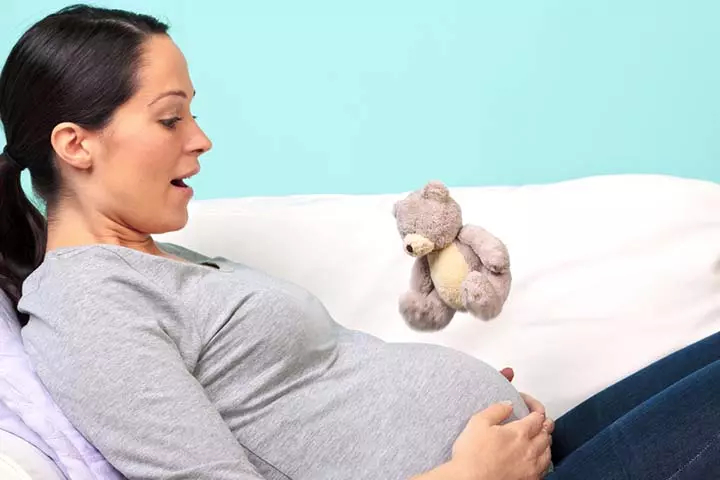
According to a study, the motor behavior of the baby inside the womb is likely to influence the temperament attributes in early childhood (6). However, this is not the only criteria for a child’s behavioral development.
These facts have made you feel good, haven’t they? You wouldn’t have imagined your baby could be this active and naughty inside the womb!
After knowing these facts, we are sure that you have several questions about kicks in your womb. Read on as we answer several such questions.
Expert Tips From A Gynecologist
- During the sixth month of gestational period, you will start to feel your baby kicking in your womb. Initially, one or two kicks/hour is a good indication that you’re pregnancy is safe.
- If you are not able to feel your baby’s kicks, wait and check after one hour.
- If you do not feel the kicks even after an hour, take sugar-based products like sweet milk, chocolate, or a pinch of sugar, and lie down in the left lateral position for ten minutes.
- Check for your baby’s kicks again. If they aren’t coming, then rush to your doctor immediately.
— Dr. Anuradha Dang, MBBS, MS
Suvidha Hospital, Jabalpur, India
Answered: 8 Questions On Baby Kicks
Here are the answers to some frequently asked questions on baby kicks:
1. When can I feel my baby’s movement during pregnancy?

You can feel the first baby movements around 18 weeks of pregnancy. These movements are called ‘quickening’. In the first pregnancy, you experience the movements towards the 20th week, while in the second and subsequent pregnancies, you can notice the signs around the 16th week (7). The baby’s movement patterns change as the pregnancy proceeds, making you notice about 16 to 45 movements in an hour.
Fiona, a mother of a baby girl, shares the experience of the first baby kicks she felt at 17 weeks of pregnancy. She describes, “When I first felt it (baby’s kicks) last week, it started as a wave sensation. It was like I could feel a wave moving from one side of my belly to the other. I then felt butterflies, but it was much milder than the nervous butterflies I get. I then felt a sensation that was like bubbles rising in my belly. I describe as what I imagine it feels like when you pour a glass of lemonade and the bubbles rise. That moved to a feeling of indigestion, and then there was nothing. That was all in the space of a few minutes (ii).”
2. What if the baby’s movements are reduced?
Do not ignore any noticeable change in your baby’s movements. Speak to your doctor, who will recommend a solution based on the stage of your pregnancy (8):
- Around 24 weeks: If you do not feel movements by the 24th week, then contact your doctor. An ultrasound scan helps determine your baby’s well-being.
- Between 24 and 28 weeks: You will be advised a prenatal check-up that includes checking your blood pressure, measuring the size of the uterus, and testing the protein levels in your urine. You will also have an ultrasound scan.
- Over 28 weeks: A full antenataliRelated to the time before the birth of a baby. check-up is advised and the fetal heart rate is monitored for at least 20 minutes. An ultrasound scan will be done to check the amount of fluid in the sac, the size of the uterus, fetal development, and the risks associated with stillbirthiDeath of a baby before or during birth. .
3. When should I be concerned about the baby’s movement?

You should worry if:
- you have less than ten movements in two hours.
- there is reduced response towards external stimuli, such as loud noise or food.
- there is a gradual decrease in the movements for two consecutive days.
4. Why do babies kick more in the womb at night?
Babies develop a unique pattern of movements inside the womb. During the day, you might be engaged in various activities. So, when your movements stop at night while you are sleeping, the fetus might become alert and begin kicking.
Also, the fetus starts responding to sounds. So, the baby may observe that there is silence outside and hence move due to the changes in the external environment.
Obstetrician and gynecologist Dr. Himali Maniar Patel advises, “Adopting a comfortable sleeping position, such as lying on your side with pillows for support, can alleviate discomfort from nighttime kicks. Using relaxation techniques before bedtime may also help reduce the frequency of being awakened by kicks.”
5. When am I not likely to feel my baby’s movement?
- You cannot feel your baby’s movements when you are active.
- If your placenta is positioned at the front of your uterus, you might not feel the movements.
- If your baby’s back is at the front of the uterus, you will feel fewer kicks than when it is lying at the back.
- If you have an increased body habitual (BMI), movements may be delayed until well into the second or third trimester.
6. Do I need to keep a count of the kicks every day?
If your pregnancy is proceeding normally, then there is no need to keep a count of your baby’s movements. But if you do not notice movements for some hours or a day, you need to monitor the kicks after a meal or when you sleep, or at the time when the baby is usually active.
Dr. Manik Pansey MBBS, MS, Anant Hospital, Jabalpur, India, advises pregnant women to maintain DMFC (daily fetal movement count chart), and check it at a fixed time every day, ideally at 8am.
Counting kicks can help you identify any change in fetal movement and, thus, recognize and prevent any complications early on.
7. What do I do if my baby is not kicking?
If you have noticed reduced movements then you may do this:
- Sit down and relax.
- Have a cold drink or snacks and keep your feet up. The coldness and the sugar in the food can cause the baby to respond.
- The baby might respond through hiccups, rolls, kicks, thumps or pokes.
 Did you know?
Did you know?8. How do I count the kicks?
Here is a daily kick count chart you can maintain to record the number of kicks per day (9).
Daily Kick Counts by Week of Pregnancy
Days | 27 | 28 | 29 | 30 | 31 | 32 | 33 | 34 | 35 | 36 | 37 | 38 | 39 | 40 | 41 | 42 |
Monday | ||||||||||||||||
Tuesday | ||||||||||||||||
Wednesday | ||||||||||||||||
Thursday | ||||||||||||||||
Friday | ||||||||||||||||
Saturday | ||||||||||||||||
Sunday |
Frequently Asked Questions
1. Is there a difference in the number of kicks between boys and girls in the womb?
As per research, there’s no difference in the number of kicks of boys and girls in the womb (13).
2. Can you tell the baby’s position by their kicks?
The position of the kicks may vary when the baby moves, so you may not be able to detect the fetal position inside the womb.
3. Are baby’s kicks stronger during certain stages of pregnancy?
Yes, the baby’s kicks become stronger during the third trimester of pregnancy (12).
4. Are there ways to encourage more movement from the baby during pregnancy?
Yes, you may encourage more movements from the baby by taking a walk, tapping or rubbing your belly, playing loud music, and having a sweet juice or a meal. Sitting with your hands on your belly and concentrating for a few minutes or having someone talk into your belly can also help your baby move in your stomach (12).
Your baby’s kicks during pregnancy are one of the most exciting parts of the journey to motherhood. It’s a gentle reminder that you and your baby are doing well and are going through a healthy pregnancy. However, the baby’s kicks during pregnancy are more than just its way of showing its likes or dislikes. The timing and the frequency of the kicks may alert you about any type of distress that the baby might be experiencing. Hence, you need to be aware of the reasons behind reducing or increasing kicks during pregnancy to seek timely medical help when necessary.
Infographic: Must-Know Facts About Baby Kicks For Mothers
During pregnancy, one of the most exciting experiences for many women is feeling the baby kick (fetal kick). Also, the baby kick can be a reassuring and bonding experience for expectant mothers and their partners. So, check out the infographic below to learn more about baby kicks and what they mean! Illustration: Momjunction Design Team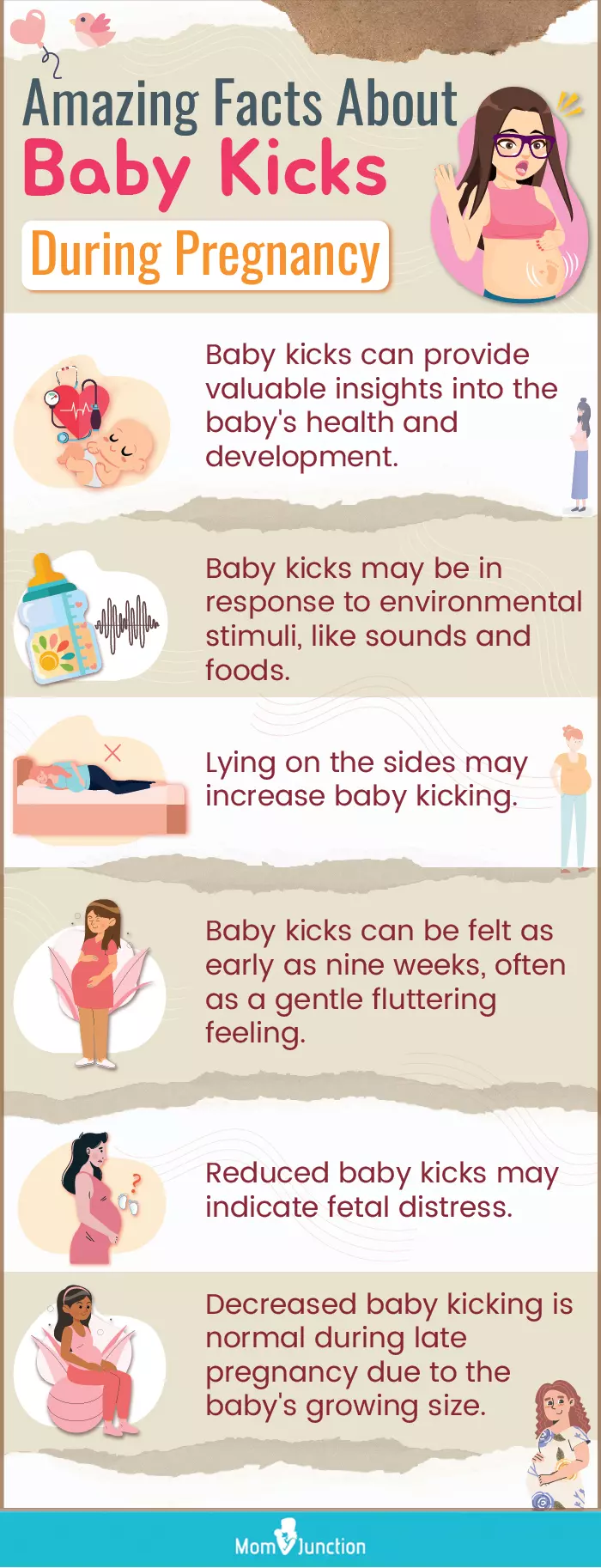
Illustration: Interesting Facts About Baby Kicks During Pregnancy

Image: Dall·E/MomJunction Design Team
Feeling your baby’s first kicks is almost always very special. Learn when to expect them and how to recognize them in this informative video.
Personal Experience: Source
MomJunction articles include first-hand experiences to provide you with better insights through real-life narratives. Here are the sources of personal accounts referenced in this article.
i. Six more weeks!! It’s still so unbelievable to me, even though I look like this (very believably pregnant);
https://julia-transition.blogspot.com/2017/05/34-weeks-baby-4.html
ii. Deciphering baby’s first kicks;
https://maybehavingababy.blogspot.com/2013/08/deciphering-babys-first-kicks.html
References
- Hearing in the Womb.
https://lozierinstitute.org/dive-deeper/hearing-in-the-womb/ - Approach to the fetal movements: a pilot study of six cases.
https://www.scielo.br/j/anp/a/yBPcJgG9vtM8SHXwMmMYLzf/?lang=en - Baby movements in pregnancy.
https://www.tommys.org/pregnancy-information/pregnancy-symptom-checker/baby-fetal-movements - Pregnancy—your baby’s movements and what they mean.
https://brochures.mater.org.au/brochures/mater-mothers-hospital/pregnancy-your-baby-s-movements-and-what-they-mean - Your Baby’s Movements During Pregnancy.
https://www.peacehealth.org/medical-topics/id/aby3689 - Janet A DiPietro et al.; (2002); What does fetal movement predict about behavior during the first two years of life?.
https://pubmed.ncbi.nlm.nih.gov/12115294/ - Baby movements during pregnancy.
https://www.pregnancybirthbaby.org.au/baby-movements-during-pregnancy - Your baby’s movements in pregnancy.
https://www.rcog.org.uk/for-the-public/browse-our-patient-information/your-babys-movements-in-pregnancy/ - Your Baby’s Activity Record.
https://mihp.utah.gov/wp-content/uploads/kickcounts.pdf - Baby movement in the womb.
https://www.nct.org.uk/information/pregnancy/body-pregnancy/baby-movement-womb - Kick Counts.
https://my.clevelandclinic.org/health/articles/23497-kick-counts - Quickening in Pregnancy
https://my.clevelandclinic.org/health/symptoms/22829-quickening-in-pregnancy - What do kicks say about well-being?
https://www.mombaby.org/wp-content/uploads/2016/03/Kick-Counts.pdf
Community Experiences
Join the conversation and become a part of our nurturing community! Share your stories, experiences, and insights to connect with fellow parents.
Read full bio of Dr. Kofi Kwaw-Asante
- Dr. Himali M Patel is an Ahmedabad, India based gynecologist with 13 years of experience. She currently practices at Nisha Women's Hospital and IVF Centre. Dr. Patel did her graduation in Medicine at Bharati Vidyapeeth University, Pune and holds a diploma in Obstetrics and Gynecology.
 Dr. Himali M Patel is an Ahmedabad, India based gynecologist with 13 years of experience. She currently practices at Nisha Women's Hospital and IVF Centre. Dr. Patel did her graduation in Medicine at Bharati Vidyapeeth University, Pune and holds a diploma in Obstetrics and Gynecology.
Dr. Himali M Patel is an Ahmedabad, India based gynecologist with 13 years of experience. She currently practices at Nisha Women's Hospital and IVF Centre. Dr. Patel did her graduation in Medicine at Bharati Vidyapeeth University, Pune and holds a diploma in Obstetrics and Gynecology.
Read full bio of shreeja pillai
Read full bio of Rebecca Malachi
Read full bio of Aneesha Amonz












